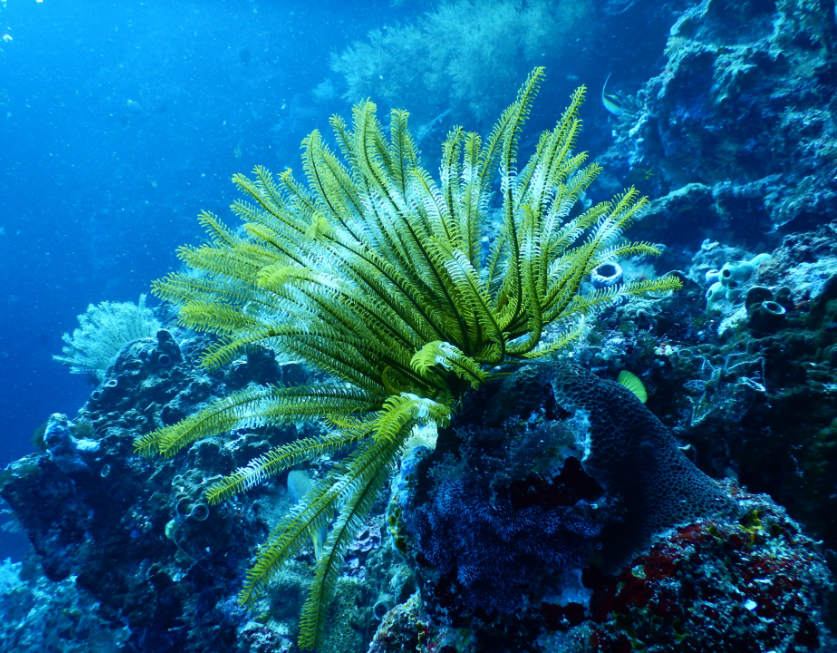This WILL NOT Be The End Of The Belize Barrier Reef
Known as the “rainforest of the sea,” the idyllic beauty and astounding biodiversity of the Belize Barrier Reef has made it an attraction for tourists from all over the globe.

A partial aerial view of the Belize Barrier Reef.
Less than 1% of the world’s oceans host these precious jewels, yet coral reefs like this one are home to thousands of marine species and support entire ecosystems with their existence. As stewards of the environment and sustainable travel experts, we want to remind you that as a collective, we are far from powerless. So, we’ve laid out some easy and inexpensive ways for you to help protect the ocean’s legacy—for generations to come.
The Declining Health Of The World’s Barrier Reefs
For the last decade, marine biologists, travelers, and ocean lovers have been grieving the relentless decline of coral reefs around the world. Climate change, including runoffs and ocean acidification, are slowly but surely destroying many of these idyllic underwater forests. In 2016, Outsider Magazine published an obituary for the largest reef in the world, The Great Barrier Reef, which lies off the coast of Australia.
Their think piece/report was incredibly saddening. As proponents of ethical and sustainable travel—enough is enough. It’s easy to feel helpless about climate change and wonder what we, as individuals, can do. However, it’s time to look past this shared sense of powerlessness and do something to ensure that the Belize Barrier Reef, doesn’t join The Great Barrier Reef in the ranks of extinct history.
There are already several conservation initiatives in place (you can find them listed below), but just in case you’re considering Belize as a destination, here’s an outline of the issues, some quick sobering facts, and a list of the extra small things you can do to protect the Belize Barrier Reef while you’re on your travels.
Threats To The Belize Barrier Reef

The ocean is much like the land, full of ecoysystems, plants, and animals—teeming with life. It would be a shame if one day, you went scuba diving and there was nothing left to see...
The Belize Barrier Reef is not only a UNESCO World Heritage Site known for its stunning coral and wide array of marine life, its health is linked to the future survival of the Belizean people. The reef itself provides food, jobs, protection, and even cultural identity to Belize, a country that we often recommend to our travelers.
As part of the larger Mesoamerican coral reef, The Belize Barrier Reef is facing many of the same health problems as other reefs in the world, but there are also some specific issues you should know about when visiting this tiny Central American country.
Learn why sustainable tourism is crucial from an expert...
Climate Change
The rising water temperatures brought about by El Niño type events have triggered massive coral bleaching. Though recovery is well underway, there’s still been an 80% reduction in live coral cover on some portions of the reef over the last two decades, according to Colin A. Young's piece "Belize's Ecosystems: Threats and Challenges to Conservation in Belize," courtesy of Sage Journals."
Increased Tourism
With 240 miles (386 km) of coastline to the east of Belize, their biggest tourist attractions are the islands and the incredible array of dive and snorkeling sites surrounding them. Visitor numbers have picked up steam since the mid-nineties but the government, the Belizean people, and the travelers who enjoy its wonders haven’t done as much as they could to protect the area. (We hope to change this!)
Take ecotourism to the next level and travel your way to a greener world when you support Anywhere’s Carbon Offset program. Purchase trees that will help you reduce your carbon footprint, and be a catalyst for sustainable tourism.
Unchecked Fishing
Of the entire Mesoamerican reef, the central Belize Barrier Reef has suffered the most. Illegal fishing practices such as Jamaican traps have decimated the population of parrotfish, juvenile fish, and other non-edible species. While this type of fishing is illegal, the central reef area is not patrolled effectively.
Oil Development
In the last decade, offshore oil exploration companies are said to be making it difficult for Belizean officials to say no, but Healthy Reef's "Belize: The Good, The Bad, and The Hopeful" report stated that in 2017, Belize unanimously passed the Petroleum Operations (Offshore Zone Moratorium) Bill. This places an indefinite stop to offshore development in the territory. Yes!
Hurricanes
As part of the Hurricane belt, Belize is vulnerable to a constant threat of serious storms which seem to be becoming more frequent and intense due to climate change. The continued destruction of the reef by hurricane means there’s no buffer for tidal waves, and coastal erosion becomes an issue affecting mangrove forests—a necessary part of overall coral reef health.
The Belize Barrier Reef Facts

Not only is the coral itself alive, it is important to other sea life as well.
Here are some quick and sobering facts before we go on to outlay what you can do to help:
- UNESCO declared Belize’s barrier reef system a World Heritage Site in 1996, but things didn’t change. Since 2009, the Belize Barrier Reef has been on the world heritage danger list.
- The government has sold many small islands within so-called marine protected areas. This has destroyed mangroves and caused agricultural runoff from the land.
- There are 1,400 species of flora and fauna at risk in the diverse ecosystem of more than a thousand small islands.
- The reef generates around 15% of Belize’s GDP. 180,000 people or almost half Belize’s population depend on income from diving, snorkeling, and fishing tourism.
- An island called Harvest Caye was recently sold to a Norwegian cruise line company which drops off thousands of passengers every month! This was despite government warnings against mega-projects.
- Belize has been praised for its sustainable fishing laws, but enforcement is another matter. Noncompliance is a recurring theme in no-fishing zones.
- The central Belize reef is rated critical with dangerously low fish stocks; the southern reefs, where fishing laws are better-enforced, hold twice the regional average. (There's hope!)
8 Things You Can Do To Save The Belize Barrier Reef

One of the most important rules of going scuba diving in a coral reef? Look, but don't touch!
Beauty and sanctity of life aside, the World Wide Fund for Nature noted in their piece "Belize: Guardians of The Reef," that the Belizean people are reliant on the reef. Not only does it act as a wall buffering them from storms, it provides a food source and income through the dive and adventure tourism industries.
You may wonder what difference you can make as a single person, but look past that and consider the following simple options the next time you’re holidaying in Central America.
1. Eat Sustainably
Wherever you choose to dine, ask the staff if the fish are caught sustainably or not. You can inquire about the type of fishing they use and avoid out of season seafood as well as consulting the WWF for a sustainable seafood guide to help you pick the right saltwater fish.
2. Buy Reef Safe Skin Care
UV absorbing compounds are the silent killers of coral reefs as they lower the coral’s resistance to the rising heat of the water. Even natural insect repellents should be cautiously used, as some can be as toxic to invertebrates as they are to insects.
3. Don’t Use Plastic
Not only do plastic straws choke turtles, plastic bottles break down into tiny pieces which kill small marine life and leach chemicals which affect the reef health. Instead take a drink bottle, ask for refills and say no to straws.
4. Don’t Buy Coral
Don’t buy the necklaces, the crafts, or take anything home as a souvenir. Doing so encourages the illegal harvesting of coral beds which will recover to only a quarter of their former glory each time they’re farmed.
5. Choose Sustainable Tour Operators
Anywhere strives to work with tour partners that share our beliefs on sustainability but when you’re booking with us make sure you tell your travel consultant that this is a priority! We can connect you with marine guides who address ecological concerns as part of their service ethos. Never be afraid to ask questions (of them and us). Expect your guides to be educated on what your limits are as a marine visitor and expect to be presented with an opportunity to give back.
6. Volunteer!
It could be as simple as a beach cleanup or as complex as a reef conservation project. If you’re a diver you can volunteer to replant coral or complete research data.
7. Don’t Touch
When you’re diving don’t use reef hooks or pointers to touch the coral and don’t use your hands as they contain oils which can harm coral. If your buoyancy control isn’t good then stay a safe distance away from the reef area as you may damage it with your fins. Look but don’t touch!
8. Donate!
You can give money to any of the following nonprofits to help out. We particularly love to support Healthy Reefs and have drawn much of our research from their up to date and easy to digest resources.
----------------------------------------------------------------------------------------------------------------
The Belize Barrier Reef is truly beautiful; see it for yourself and know why we must preserve it...
Healthy Reef - www.healthyreefs.org/
World Wildlife Fund - www.wwfca.org
The Nature Conservancy (TNC) - www.nature.org/wherewework/centralamerica/belize/
Ensure The Health Of The Belize Barrier Reef

Brain Coral can be found in the oceans of Belize.
With huge issues such as climate change, it’s all about awareness and wise action. You may not be able to alter the course of the world immediately, but by being vocal about a series of small choices, you can change social attitudes towards reef health and do your part to protect the jewels of the ocean. Try sharing this article as a start, and consulting Anywhere Travel for sustainable tour operators on your next Central American holiday.

Emma Harrison-Clark, Anywhere Contributor